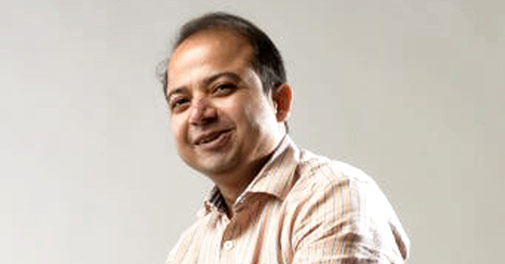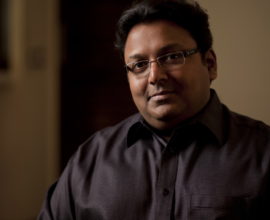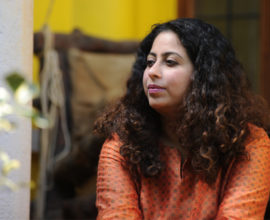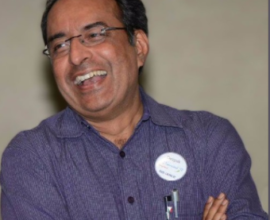Hindustan Times’ National Business Editor gives Valuable Author Tips
The transcript:
[Music]
Kiruba: Hello and welcome to the first book podcast – a show that is dedicated to helping people achieve their dreams of publishing their first book. In this podcast series, we have conversations with bestselling authors worldwide and ask them about their journey as an author. This is where they reveal their secrets and techniques that helped them become prolific writers and authors.  This podcast is supported by Notion Press, one of the world’s fastest growing publishing houses. They have a community of over 41,000 members and help distribute books to over a 100 countries. In this episode, we speak with Suveen Sinha, who is the national business editor at Hindustan Times. He was earlier the executive editor at Business Today magazine. He has been a business journalist for over two decades and most of those were Business Standard, Business Today, and Outlook magazine. He has authored two books. His first is a biographical book on Jagdish Khattar, the ex-managing director of Maruti Suzuki. His second book is titled The Tip of the Iceberg, which looks at behind the scenes of startup companies that have become uber successful. The book focuses on the challenges that the startup entrepreneurs had to overcome and the hurdles they had to cross in order to become the successful multi-millionaires that they are today. In this podcast, Suveen talks about his journey as an author and offers several valuable inputs for any wannabe author to make their book dreams come true. Let’s listen to Suveen Sinha.
[Music]
Kiruba: Suveen, thank you so much for taking your time to come on this podcast; truly appreciate it.
Suveen: My pleasure.
Kiruba: Suveen, first, congratulations on the launch of your second book – The Tip of the Iceberg. Can you give us a quick sneak-peek into what the book is about?
Suveen: Surely, and thank you for your congratulations. The book is about the reality on being an entrepreneur in India and doing a startup. Many a times, we tend to get carried away by the build up around us that doing a startup is a romantic thing to do; it’s about evaluations, making a lot of money, changing the world, etc. This book tries to tell you what the reality is and what it really takes to build a startup in India. And the story is told through the narratives of several people who have done it or tried to do it. Some of them have been successful and some of them have failed at it.But all the stories are about what it takes to build a startup in India, which is why the subtitle of the book is the Unknown Truth behind India’s Startups.
Kiruba: Thank you for doing that because typically, most books glorify success and very hardly get to see the other side – the failure part of it. I haven’t read your book yet, but from the description that you are giving me, it has a nice balance.
Suveen: Okay, and thank you and I hope you will give me feedback once you’ve read the book.
Kiruba: I will do that. So, this is your second book. Your first one is titled Driven, where you co-authored with Jagdish, the iconic man behind Maruti. Do you want to give us a tweaked version of what the book is about?
Suveen: Yes, of course. So, a lot of people who read that book were surprised that the book was not all about Maruti. The book actually begins at the time of the partition because Mr. Khattar’s family, who were already successful business people at the other side of the border and after the partition, they came here with nothing; really nothing in their hands. They got something from the government, which was being given to refugees and then through sheer enterprise, they made the most of it. And Mr. Khattar was the first in his family to take up a family job. Everyone else was an enterprising businessman and through Mr. Khattar’s eyes, we look at how the Indian economy and bureaucracy evolved. The famines, the grain crises, the ships coming from the US, and so on and how the bureaucracy evolved and how Noida, for example, was built, what was it like to work with Sanjay Gandhi. Even if I see for myself, it’s a fascinating story of how India evolved over the decades.
Kiruba: Beautiful! I look forward to reading that book also. So, Suveen, you now hold a fairly, you know, very busy full-time job in Hindustan Times. So, how do you find time to write your books?
Suveen: Yes. So, I actually hold one more full-time job, which is to take care of my son, who is very energetic two-years-and-three-month-old boy and all my time at home, whenever he is awake, is spent with him. But you know book writing is something that I might sound a bit clichéd when I say this but once you come across stories that are compelling, you find that you have no option but to write that book. So, let me just take you back to about a year and a half year ago, when I first started writing this book. That was the time when everybody in India wanted steel jobs. We were opting out of campus placements, funding was easy, valuation was surging, and startup was this big romantic thing that everyone wanted to do. So, I started meeting entrepreneurs, successful and unsuccessful ones, to find out whether they had it in them to face the kind of trials that Steve Jobs faced in his career and Jobs, for all his successes, had very, very low phases in his career. Not only when he dropped out of college, which was not by choice. He dropped out because he did not want to spend his adopted parents’ savings on his college education and the second time when he was chucked out of his own company, they were very low phases for him. I wanted to see if our guys have what it takes to go through the kind of journey Steve Jobs had and I found that many of our guys had gone through phases of intense struggle before they really came up and some of them could not come up. If I could recall just a few examples, you know, Vijay Shekar Sharma of Paytm, in a phase before he became the promoter and CEO of this multi-billion dollar company used to go home to his rented house only after midnight because he did not want to face his landlord. Even Kunal Behl of Snapdeal, he has scraped plastics off things at a factory before he went to study in the US and when he was working in the US, he was deported to India and he really did not know what to do.
Kiruba: Wow!
Suveen: Yeah. You know there is this person I admire a lot; his name is Shashank N.D. He is the force behind Practo, which is the medical services app and startup and website. Shashank used to keep his bed strategically close to his worktable because very often he would collapse from his work chair down on the floor and end up hurting himself. So, then he pulled his bed so that if he collapses, he collapsed into the bed and not onto the floor.
Kiruba: [Laughs]
Suveen: You know, Phanindra Sama, who setup Redbus, was so much under stress that he took refuge in Vipassana because his mind was completely going out of control. It took 12 days of Vipassana to actually control his mind and to tell himself that it was alright to take a break because he had been on the treadmill all his career. You know, I could go on but that’s not the point of this podcast. All those stories and many more are in the book and the names I take are successful ones. I have stories about people who became friends and then they set up a startup and then they ended up fighting and their biggest regret is not that their startup failed but that their friendship had failed. All those stories are there.
Kiruba: Got it. But you know as you were describing this, I was just trying to put myself in your shoes, Suveen. So, you have a full-time job, so obviously your day time is completely taken and then when you go back home, the apple of your eye is your son and the only time that you will ever have time to write is when your son goes to sleep. Walk us through in the last one-and-a-half years how you scraped time to put this book together.
Suveen: So, the only thing I could sacrifice was my sleep because I did not want to sacrifice my time with my son and I did not want to be dishonest at my full-time job, which actually pays the bills. Book-writing does not pay the bills too much; the full-time job does. So, I put in my 100% at my day job, so the only window I had was to wake up in the morning and by morning, I mean 4: 30. It is my son who wakes up at 7:30 or 7:40. So, I had a three-hour window in the morning to just write as many words as I could, which was very good in a way because all my thoughts and energy were channeled to suit that window. This is how much time I had and this is what I had to do. So, I didn’t have the time to loiter and let my mind wander. You know, I had another interview in a newspaper and they were asking me if I ever suffered a writer’s block and my answer was writer’s block was a luxury I could not afford. All those stories I had come across, they had to be written. It was that compelling feeling and there was this limited amount of time. I mean who can afford a writer’s block in such a situation?
Kiruba: Correct. I have also heard from other people that early mornings are the best times to write because your body is well rested, so is your mind. So, some of the clearest thoughts come in the early mornings and because you’ve done that, would you support that statement?
Suveen: Yes, absolutely! See, I had two choices – one was either to stay up in the night and write or wake up in the morning. I chose the morning thing because if I did at night, not only is my body tired but my mind is cluttered with the thoughts of what happened during the day. Whereas, early in the morning, when the mind is fresh and you know there is something about dawn or pre-dawn hours; I advice everyone to give it a shot. When you wake up before sunrise and if you, either if you step out of the house or you don’t, there is a certain energising thing that you feel rushing through your body, which is just lovely and everyone should make use of that.
Kiruba: I am guessing that at Hindustan Times or in your previous avatars earlier, most of the story lengths that you would have written would have been 1,000 to 2,000 words. But a book project is something 50,000+ words.
Suveen: 77,000 is what I wrote for the Tip of the Iceberg.
Kiruba: Wow! So, these are two different bees, right? So, how did you adapt? For a guy who writes 1000 to 2000 words on an average, how did you adapt to writing a 77,000-word book?
Suveen: In the seven years that I spent at Business Today, that was the time the magazine encouraged a lot of long-form writing. So, I did manage to break out of the [unclear] journalism model there and I wrote quite a few cover stories going up to 6,000 words and 6,500 words. I mean, even then, I found myself thirsty for more. I am a great fan of long-form writing and I consume a lot of that writing. When I read the New Yorker or Bloomsburg Business Week or some of the very fine examples of long-form writing, I tend to absorb a lot of how they do it, how they construct their stories, how they keep things going at a good pace. To make a distinction between one reader and another, I am a very deliberate and conscious reader. So, even when I’m enjoying the story that I’m reading, I look at the technique of it. I look at how one paragraph leads to another paragraph. I look at sentence constructions and I am a great fan of writers like Michael Lewis, Tom Wolf, who were journalist authors. So, if you read this really famous story that [name unclear] did for the inspired magazine called [inaudible]. Now, that one story is probably 12 or 15,000 words; I don’t even know how long it is. But once you start reading, you just cannot stop. That is how gripping the narrative is. So, in my own, small and modest way, I tried to do a bit of those things.
Kiruba: So, the takeaway from this is for people to really read good authors and good writers and imbibe those good qualities in your own writing.
Suveen: So, in my journalism career, I have trained a lot of people because the many years that I have spent at Business Standard, we used to hire a lot of trainees from journalism schools because Business Standard is a great newspaper but not the richest newspaper. We survived a lot on a system of getting trainees and training them in the newspaper and I used to hold classroom sessions with them and invariably, my first sentence to every new batch used to be, “Listen guys, I am going to tell you something here, which I am going to tell you hundred times, thousand times, more in our interaction, which is read. Read as much as you can because you cannot write unless you read enough and you cannot write well unless you read good writing. You know, they go really hand in hand.
Kiruba: Now, writing a book is one thing but having it published is another challenge most authors have. So, you, of course, got into one of the best publishing houses- Penguin. Walk us through how that happened.
Suveen: So, yeah, Penguin is a lovely publishing house because they believe in the highest quality of production values. So, if you look at any book that Penguin brings out, the paper, printing, design, format, and the selection of fonts, which is very important for readability, is very good. And I got really lucky because I started as a co-author to Mr. Jagdish Khattar, who had the compelling story to tell and Penguin was very keen on that. Now Driven is a book that did not set the bookstalls on fire; it did not sell 100,000 or 50,000 copies. It had its own modest success. But Driven was a great critical success. It crossed a large number of publications and all the reviews were favorable. Everyone said that it’s a very well-written book. So, Penguin came in touch with me even after Driven and I thanked them for it, of course. However, when the Tip of the Iceberg was being written, there were a several other publishers interested in it, who wanted to publish a book like this. But Penguin, I think because of the experience of working with me earlier, so they and Mitra, who was a hotshot at Penguin, he had stayed in touch with me. He likes to say that Suveen never misses deadlines. I meet all my deadlines and that makes a good impression and the critical success that Driven got; so Penguin wanted to work with me. So, they really wooed me and I had no choice and I didn’t want a choice. I was just happy to go along with Penguin.
Kiruba: Sure, sure. It’s always nice to be in that position.
Suveen: Oh yes. Oh yes. Oh yes, yes, yes.
Kiruba: [Laughs] Writing a book and getting it published is one thing but getting the world to read your book is another challenge. So, walk us through some of your marketing techniques that you’ve either already done or you’re about to do.
Suveen: So, I’m a great believer in thinking that a good product sells itself and no amount of marketing can sell a bad product. You can take examples from any sector; be it a consumer good, or a car, or a phone, anything. I mean, after all, freedom 251, the phone priced at Rs. 251 got the marketing success but what is happening to it really. So, anyway, let’s not go too far into those examples. As far as my marketing technique is concerned, I have tried to write the best book I could write but a lot of marketing and sales efforts were done by Penguin. See, being a business editor, there is a bed of tricky situation also because I will not ask any corporate entity or anyone who I write about to do anything for a book because that involves a conflict of interest. Penguin’s marketing team does what it wants to and I go along with them to an extent. For example, the book launch. So, I was there at the book launch and I in fact, I conducted the panel discussion; I made a small speech and now Penguin wants me to go to Lit Fests, I will go there. Penguin wants me to go to some important book shops and do some book signings and book readings and I will do that. I do put out things on social media, which I think is very important. Although I do not have a large community on social media, but in my own small way, I tell my friends what I am doing, some of whom are very sympathetic towards me and they seem to like me for whatever reasons. They circulate it on words. So, let me boil it down to a shorter answer than I have been giving so far. In today’s day and age, marketing anything is much easier thanks to the advancement of technology and the book is a product as good as any product. So, anyone should be leveraging social media. Eventually, it boils down to whether you have a good product to talk about or not. I don’t know if you’ve read this book that everyone was reading at one time called the Fountain Head by Ayn Rand. So, in that, the hero of the book is dragged into court because he builds a temple in which the main statue is of a nude girl and he is charged with being disrespectful to religion, apostasy and all those things and he decides to argue his own case in court. And in his argument, he says nothing at all, not even one word. He presents a bunch of photos of the temple and the nude statue to the church and his argument is that if you like what I have made, I am not guilty. If you do not like what I have created, I am guilty. So, in my own way, I tried to take that approach. Here is the best book I could write, given the limitations of my abilities. Now, if you like, you will buy it and you will read it. If you don’t like it, I can’t do much about it.
Kiruba: Brilliantly put. Let me take you back to the writing portion of it. Your book took a year and a half in making. Have you had any downtime yourself?
Suveen: Sorry, what do you mean by downtime?
Kiruba: Distracted from writing, work taking you away from writing, or you feeling low, suddenly you start to questioning if my writing is not good enough and I should go polish it, waiting for an inspiration to strike you, all these.
Suveen: No, inspiration was never a problem. I never had doubts about the writing that I was doing. The biggest constraint, as I mentioned earlier, was time. So, you know, I have two laptops. One is the office laptop and another is my personal laptop. I do not do book-writing laptop because in my own mind I want to have my separation. Nobody should be able to say that I used office infrastructure to write a book, which was more a personal project. This was not published by HT Media, right? It’s by Penguin. So, I used to carry both laptops wherever I went. You know, for example, if I have a meeting outside office at 3 and the traffic is good and I have landed there at 2: 45. I have 15 minutes in hand; I will take out my personal laptop and start writing my book. You know, fortunately, I have a gentleman who drives my car. So, I leave office, I get into the car, the gentleman starts driving, in the backseat I open my book-writing laptop and the 45 minutes to one hour that it takes to get home, I am writing. So, inspiration was never a problem, time was. And I [unclear] out every minute I could from wherever I could.
Kiruba: Got it. So, one last question. Do you have any other good advice for aspiring authors?
Suveen: Yes, I don’t know whether the advice is good or bad but I have advice, nonetheless. One is a repetition of my earlier advice, which is to read good writing. I used to tell my trainees and I’ll tell the same thing everyone a hundred times. Read good writing as much as you can. Number 2: Be aware of what is happening in this world because any good writing has to respond to the world that we live in. It cannot be created in isolation, especially, the kind of writing that I do, which is non-fiction. Number 3: Believe in your story. If you don’t believe in your story, do not write it. Write a story that you would want to read. If you believe in the story, if you are convinced about the thickness of the story, if you have a compelling story to tell, do not be too conscious of how your fingers are moving on the keyboard. Think about the story, think about your characters, and words will come out on their own. I make a clear distinction between good writing a bad writing in a slightly different way and this I have borrowed from someone. This is not my original thinking that good writing is something that draws attention to itself. For example, you will read a sentence and say, “Whoa, lovely sentence, beautiful words, what construct, oh I did not know this word, I learnt something new”. But you’re constantly thinking about the writing part. That, I think, is not great writing. A really good writing is one that draws attention to the story that you are narrating. So, you do not notice the words, you do not notice the sentence construction, you are constantly flowing with the story. So, always focus on the story, not on the words, and not on the sentence. If you are telling the write story, an interesting story, words will take care of them.
Kiruba: Brilliant. Thank you for the advice and on that note, Suveen, on behalf of all the listeners, thank you so much for taking the time out and really sharing your experience. Truly appreciate it.
Suveen: Thank you, Kiruba. It has been a great pleasure talking to you and I hope we meet face to face someday.
Kiruba: Yes, absolutely. Same here, Suveen. Thank you.
Suveen: Thank you, bye.
[Music]





